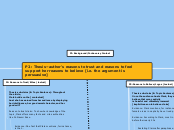P2: Thesis--author's reasons to trust and reasons to feel support her reasons to believe [i.e. the argument is persuasive]
P3: Reasons to Trust/ethos (contextual)
Thesis sub-claim (& Topic Sentence of the paragraph): Clark provides situated information that establishes her reputation with her photograph and short biography
Describes Intended Audience
Evidence from Biography: President of Earth People
Evidence from Biography: Author of numerous books including...
Evidence from Biography: Public Voices fellow
Reason to Trust claim: Biography displays author's deep involvement in community and credibility
Summary Sentence (restates topic sentence + more info): Photograph and biography give reasons to trust by showing that speaker has good standing in community and is able to provide reliable information.
P4: Reasons to Trust/Ethos (textual)
Thesis sub-claim (& Topic Sentence): Throughout the article, Clark builds on the [contextual]
trust she has earned from her audience by displaying her intelligence, her good moral character, and her good will.
Reason to trust claim: To show her knowledge of the topic, Clark offers many facts and cites authorities like Dr. Naomi Rose.
Evidence: One fact that Clark mentions, for instance, is that...
Restating claim after direct quote: By including this fact Clark-shows that she is well-educated.
Reasons to trust claim: Furthermore, Clark's extensive research on this topic displays her avid concern for orca safety. And her concern for the orca's well-being portrays her strong moral character.
Evidence: Since having the whales released will have virtually no impact on her personally, her concern for their well-being appears to be completely selfless.
Evidence: To prove that she is serious about this issue, she states that her family now "is exploring other options for learning about marine life in a setting that is appropriate to the species" (Clark).
Restating claim after direct quote: Clark's refusal to visit SeaWorld and her effort to study marine mammals in a more natural environment give the audience reason to trust her as someone dedicated to this cause.
Reason to trust claim: Clark shows goodwill to her audience by making the article easy to read, even for people who have no previous knowledge of the controversy.
Evidence: Clark uses an anecdote, for instance, at the beginning of the article when she states that prior to undertaking her research on the topic, she used to take her children to SeaWorld (Clark).
Restating claim after presenting evidence: This anecdote allows Clark to relate to those readers who still attend SeaWorld but remain unaware of the dangers of orca confinement.
Summary Sentence: In all, her thorough research, her moral character [as demonstrated in the text], and her clear writing style give her audience several reasons to trust her as a knowledgeable, caring, and smart person.
P5: Reasons to Believe/Logos (textual)
Thesis sub-claim (& Topic Sentence): Once the audience trusts Clark, they are prepared to believe that orca captivity is harmful and ultimately immoral
[implicit reason to believe claim]
Evidence: Clark mentions, for instance, that only two femals orcas in captivity have lived past 40
Evidence: According to Clark, most in captivity die before their early 20s
Restating Claim after paraphrase: Since the audience already trusts Clark as an informed and credible source of information, they will accept the information she offers, and they will conclude that... shortened lifespan results from captivity.
Reason to believe claim: Clark furthermore states that many captive orcas suffer from anxiety and express it through abnormal behavior and violence.
Evidence: Clarke gives several examples as evidence to support this reason...
Restating claim after direct quote: Based on this evidence,
the audience should conclude that orcas suffer a negative impact.
Reasons to believe claim: Clark also explains that SeaWorld has a monopoly on orcas. Based on this information, she asks the audience to conclude that SeaWorld is not held accountable.
Evidence: Clark cites an authority to provide evidence supporting this reason. She quotes Dr. Naomi Rose, who says...
Restating claim after direct quote: The audience should conclude, based on this evidence and these reasons, that SeaWorld's practices are not as good as the audience claims.
Evidence: Finally, Clark asks the audience to conclude that "ending the public display of orcas... would have only minor economic impacts."
Reason to Believe claim after direct quote: She offers evidence to show that the task is not unattainable and would not devastate SeaWorld.
Summary Sentence: Overall, Clark's reasons and her evidence lead the audience to believe that orca confinement is not safe.
P6: Reasons to Feel/Pathos (textual)
Thesis sub-claim (& Topic Sentence of paragraph): Though the subject of Clark's article can call forward strong emotions, Clark only gives her audience a few reasons to feel particular emotions.
Reason to feel claim: She does use pejorative language regularly to make her audience feel angry toward SeaWorld...
She uses the word suffer, for instance, continuously... to describe orcas in captivity.
Restating claim after evidence (+analysis): The negative word conveys agony and distress, which makes the audience feel sympathetic...
Evidence: Furthermore, Clark states that "after decades of producing and consuming this entertainment..."
Reason to feel claim (+analysis): Clark's accusation causes the audience of environmentalists to feel guilty... Their guilt may contribute to the audience's belief that the confinement should end.
Reason to feel claim + evidence: Clark continues to give the audience reasons to sympathize with orcas by describing them as "enormously sentient fellow mammals"
Evidence: She claims that they suffer from the "cruelty of captivity"
Reason to feel claim restated (+analysis): The word "sentient" contrasts with the word "cruelty," making the audience imagine this sympathetic animal undergoing trauma.
Summary Sentence: If the audience feels this sympathy and guilt they will conclude more forcefully that orca confinement at Sea World is harmful and ultimately immoral.
